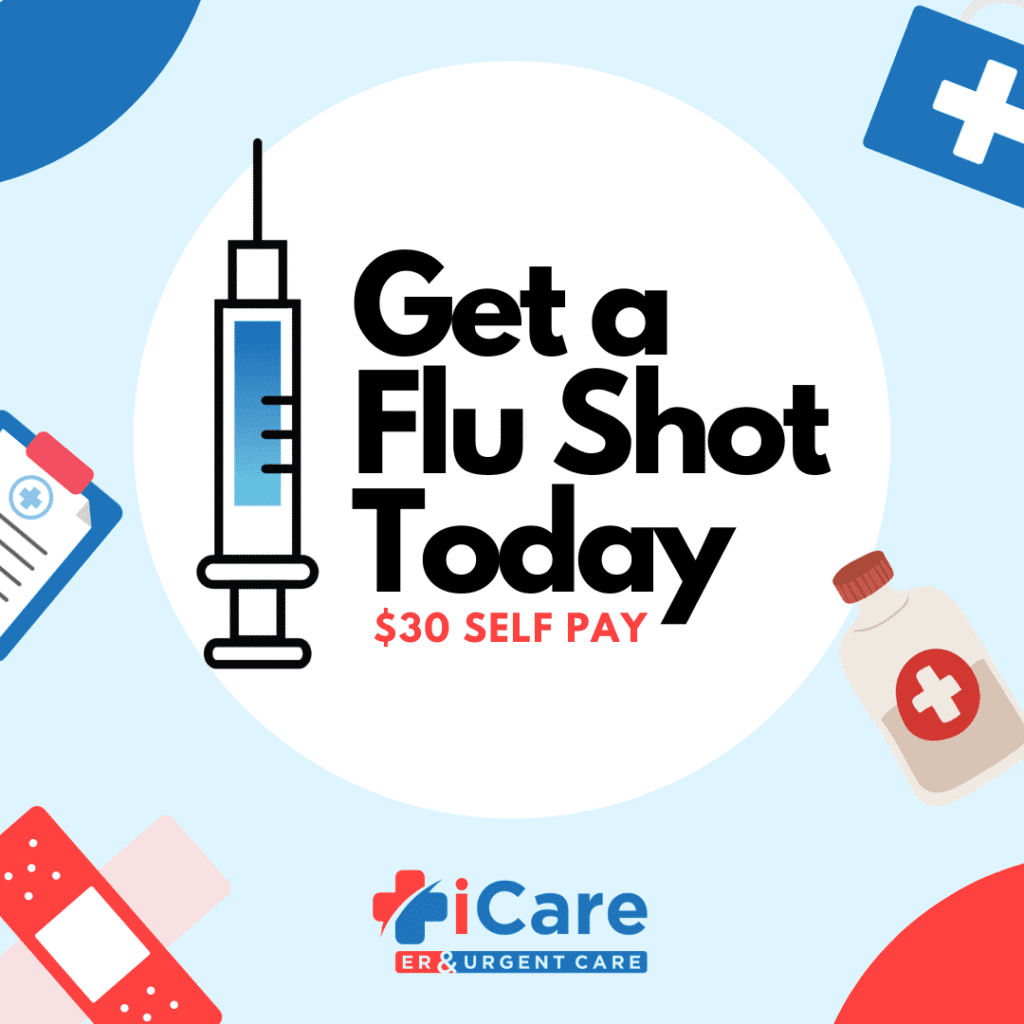As we enter a new season, the threat of the flu virus requires us to be proactive in safeguarding our well-being and that of our communities. This article explores the significance of flu shots or vaccines, sheds light on the flu, its symptoms, and early warning signs. We’ll also uncover why getting vaccinated matters. Additionally, we’ll address common questions, such as the first sign of the flu and how these viruses spread. Discover where you can easily access your flu shot, with a spotlight on iCare ER & Urgent Care.
What is the Flu?
The influenza virus, or flu, is a contagious respiratory illness with symptoms ranging from mild to severe. According to the Centers for Disease Control and Prevention (CDC), millions of individuals contract the flu annually, leading to hundreds of thousands of hospitalizations and tens of thousands of deaths in the United States alone.
What is the first sign of the flu?
Recognizing the early signs of the flu is crucial in timely identification. The first sign of the flu often includes a sudden onset of symptoms such as fever, cough, sore throat, body aches, fatigue, and headaches. Some individuals may also experience vomiting and diarrhea, especially children.
How Do Cold and Flu Viruses Spread?
One common way that cold and flu viruses spread is through respiratory droplets produced when an infected person talks, coughs, or sneezes. These droplets can land in the mouths or noses of people who are nearby or possibly be inhaled into the lungs. Additionally, touching surfaces or objects contaminated with the virus and then touching one’s face can contribute to the spread of these viruses.
When is Flu Season Season?
The rise in flu activity typically occurs in October, extending its reach until May. The peak of flu season, characterized by increased virus transmission, usually unfolds between December and February. This heightened risk period underscores the importance of adopting preventative measures, notably through vaccination.
How the Flu Vaccine Works: The flu vaccine stimulates the immune system to produce a defensive response against the influenza virus. It contains inactivated or weakened forms of the virus, prompting the body to build immunity without causing the flu itself. This proactive approach ensures that your immune system is better equipped to fend off the virus if exposed.
How to Prevent the Flu
While the flu can be unpredictable, taking preventive measures is key to reducing the risk of infection. According the Center for Disease Control (CDC), Here are some practical steps you can take to safeguard yourself and your community:
- Get Vaccinated: The most effective way to prevent the flu is by getting vaccinated annually. The flu vaccine is a powerful tool in building immunity and reducing the severity of symptoms if you do contract the virus.
- Practice Good Hand Hygiene: Regular hand-washing is a simple yet effective way to prevent the spread of flu viruses. When soap and water are not available, use an alcohol-based hand sanitizer containing at least 60% alcohol.
- Avoid Touching Your Face: Viruses can enter your body through your eyes, nose, and mouth. Minimize the risk by avoiding touching your face, particularly with unwashed hands.
- Practice Respiratory Hygiene:Cover your mouth and nose with a tissue or your elbow when coughing or sneezing. Dispose of used tissues properly and wash your hands immediately.
- Maintain a Healthy Lifestyle: A well-balanced diet, regular exercise, and adequate sleep contribute to a robust immune system. Ensure you are taking steps to maintain your overall health.
- Stay Home When Sick: If you’re feeling unwell, it’s essential to stay home to prevent the spread of the virus to others. Rest, stay hydrated, and seek medical attention if necessary.
- Clean and Disinfect: Regularly clean and disinfect frequently-touched surfaces, such as doorknobs, light switches, and electronic devices. This reduces the risk of coming into contact with the virus.
- Practice Social Distancing: In crowded settings, maintain a safe distance from individuals who appear to be sick. Social distancing is a preventive measure that helps reduce the transmission of the virus.
- Stay Informed: Stay updated on flu activity in your area and follow recommendations from health authorities. Being informed allows you to make educated decisions about your health and the health of those around you.
Empowering Immunity: How the Flu Vaccine Safeguards Your Health
The flu vaccine operates as a powerful ally against the influenza virus by leveraging the body’s natural defense mechanisms. Comprising inactivated or weakened forms of the flu virus, the vaccine acts as a simulated invader, prompting the immune system to produce a defensive response. This response involves the creation of antibodies, specialized proteins designed to recognize and combat the virus. Should the vaccinated individual later encounter the actual flu virus, their immune system is primed and ready to mount a swift defense, preventing or mitigating the severity of the infection. Essentially, the flu vaccine is a proactive strategy that empowers the body to build immunity without succumbing to the illness, offering a crucial line of defense in the battle against seasonal influenza.
Who Should get a Flu Vaccine?
The flu vaccine is recommended for everyone aged six months and older, with few exceptions. Certain demographics face a higher risk of complications, making vaccination a critical safeguard for:
- Young Children: Those aged six months to five years are more susceptible to severe flu complications.
- Elderly Individuals: Those aged 65 and older are at a higher risk of flu-related hospitalizations and complications.
- Pregnant Women: Pregnancy heightens the risk of severe illness from the flu, posing potential threats to both the expectant mother and the unborn child.
- People with Chronic Health Conditions: Individuals with conditions such as asthma, diabetes, and heart disease are more prone to severe complications if infected.
Where to Get Your Flu Shot Near You: iCare ER & Urgent Care
Now that you understand the importance of getting a flu shot, the next question is, “Where to get a flu shot near me?” Look no further than iCare ER & Urgent Care, your trusted partner in health.

How to Get a Flu Shot at iCare:
- Visit Our Website: Explore our website to find the nearest iCare ER & Urgent Care location in Frisco and Fort Worth, TX.
- Walk-In or Schedule an Appointment: Flu Vaccines are available in our urgent care, open 7am-8pm daily. iCare ER & Urgent Care welcomes both walk-ins and scheduled appointments for flu vaccinations. Choose the option that suits your preferences and needs.
- Consult with Our Medical Professionals: Upon arrival, our friendly and knowledgeable staff will guide you through the process. If you have any questions or concerns, our medical professionals are here to address them before administering the vaccine.
- Receive Your Flu Shot: Relax in the knowledge that you are taking a proactive step towards safeguarding your health. Our team will administer the flu shot efficiently, ensuring a comfortable experience.
Don’t wait until flu season is in full swing. Visit iCare ER & Urgent Care to get your flu shot and protect yourself, your family, and your community from the flu. Your health is our priority, and we’re here to make the vaccination process convenient and accessible for you.


